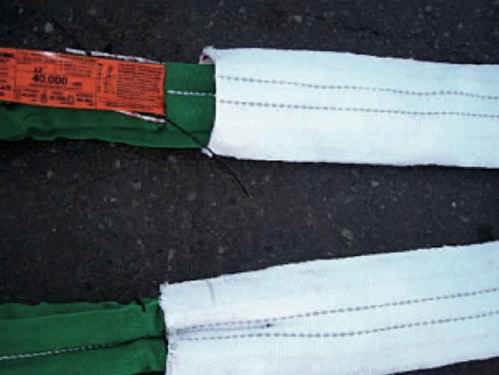An intense, repetitive job where every second counts: lifting steel coils, typically weighing up to 35 tons each, into the hulls of ships can only be done by highly experienced stevedoring crews. And these crews must perform each step to perfection to avoid damaging the coils – and themselves. Plus, given that a skilled crew costs an average of $1,500 per hour, time is money.

In need of a lift
US stevedoring company Canton Stevedoring understood this key industry challenge better than most. As one of the largest stevedoring companies on the East Coast, Canton was looking for a more efficient way to lift heavy steel coils onto the docks of Baltimore, MD. The company had been using traditional wire mesh slings. Now it was ready for a solution that would save time and money without compromising safety in any way.
Enter Dyneema®. Canton intensively tested high-performance Twin-Path® slings made with Dyneema® and manufactured by I&I Slingmax. The slings were equipped with heavy-duty Cornermax™ sleeves made from Dyneema®, providing superior cut protection from the sharp edges of the coil. So how did they perform?
Handling the challenge
The Twin-Path® slings made with Dyneema® were put to work unloading the cargo of more than 200 steel coils. For Rex Wheeler, President of Canton Stevedoring, the difference was immediate: “The slings were immediately much easier to handle. It made a big difference to our crews.”
That's because Dyneema®’s high-performance ultra-high-molecular weight polyethylene fiber is 15 times stronger than steel, weight for weight. This means slings made with Dyneema® can have the same diameter and strength as slings made with steel wire, but at just a fraction of the weight.
Efficiency up, costs down
Thanks to Dyneema®, the lightweight Twin-Path® slings were so much easier to handle that only two Canton crew members were needed to handle each sling, instead of the usual four needed for steel wire slings. What’s more, the stevedores were able to work significantly faster: up to 25% faster, in fact. Field tests show that 1.5 hours can be saved for every 90 coils unloaded – and for an average shipload of 200 coils, this translates into savings of more than three hours, or more than $4,500, per ship.


A safe harbor for crew and cargo
As a people-driven company, Canton makes the safety of its crews its top priority – which is another reason why steel slings, which can fray and expose dangerous hooks of cut wire, simply didn’t cut it. Plus, these defects can also damage valuable cargo loads: in fact, on average, 5% of steel coils are damaged by the steel mesh lines used to lift them.
By enabling a lightweight and smooth surface, Dyneema® makes a difference here too. Switching to Twin-Path® slings brought immediate benefits for Canton: “The risk of injury was greatly reduced because the slings are light and soft,” Wheeler explains. “It was fantastic to see our crew unloading the steel coils without any damage to themselves or the cargo, including the packaging.”
Built for the long haul
It was a great start – and as Canton has discovered since completing the test, Dyneema®-based slings are also a sound long-term investment. That’s because the unique properties of our Dyneema® fiber enable slings that are extremely durable, with superior resistance to cuts, abrasion, UV, and chemicals.
With a longer safe service lifetime, Dyneema®-based slings are ideal for use in demanding, repetitive lifting applications – and ideal for Canton Stevedoring. “After 100 lifts, there was no noticeable wear on the slings or sleeves,” adds Wheeler. “With less need to replace them, we save time and money.” Another all-round success for Dyneema® and our partners!
Contact our experts
Interested in learning more about Dyneema® for your project or end-use application? Reach out to our team of experts today.
Get in touch